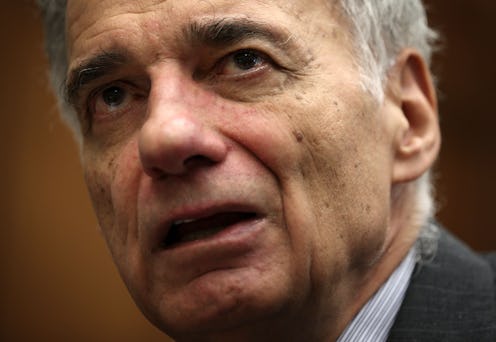News
Ralph Nader And Bernie Sanders Aren't That Similar
The idea that disillusioned Bernie Sanders supporters will refuse to pull the lever for Hillary Clinton if she becomes the nominee is a real fear, and it’s bringing up comparisons to another candidate's 2000 presidential run. Because that campaign has renewed contemporary relevance, it’s worth asking: Did Ralph Nader cost Al Gore the 2000 election? Some Democrats have started to worry that Sanders’ protracted campaign against Clinton will hurt the party’s chances of winning in November, which has led to some drawing comparisons between Sanders and Nader.
The word “cost” is tricky, because it implies that one factor, and only one factor, was responsible for the election’s outcome: Nader. But in a very close election, any number of alternative developments could produce the eventual winner of the race; that’s what makes it a close election, and the 2000 race is no exception.
There are quite a few hypotheticals that could have tipped the electoral college vote to Gore and prevented George W. Bush’s presidency from ever happening: If the ballots in Florida were less confusing, or if Bill Clinton had campaigned with Gore, or if the Supreme Court had decided differently, Gore might have been president.
So, let’s ask the same general question in a less loaded and more accurate way: If Nader hadn’t run in 2000, would Gore have become president? It’s impossible to say for certain (and anyone who claims otherwise is incorrect), but there’s a compelling case to be made that yes, Gore would have become the 43rd president if Nader hadn’t run in 2000.
The easiest way to see this is in final vote tallies in two states, Florida and New Hampshire. If either state had awarded its electoral votes to Gore, Gore would have won.
In Florida, after all of the recount madness was over and done with, Bush was declared the winner by just 500 votes; Nader received more than 97,000 votes in Florida that year. If even half of one percent of Nader's voters had instead cast their ballots for Gore, Bush wouldn’t have won the state, the electoral college, or the presidency.
Then again, the ballots themselves were horribly unreliable in Florida, so maybe it’s not the best case study here. For all we know, all of those extra Gore votes would have mistakenly gone to Pat Buchanan thanks to the misleading and confusing ballot used in Florida's Palm Beach County.
So, let’s look beyond Florida and instead at New Hampshire, where Bush won by about 7,000 votes. The same year, Nader received around 22,000 in the Granite State. Only about a third of Nader voters would have had to throw their support behind Gore in order to have changed the outcome of the election.
The enormous caveat, of course, is that we don’t actually know how many Nader supporters would have voted for Gore if Nader hadn't been in the race. It’s entirely conceivable that none of them would have, and if that’s the case, then Nader didn’t cost Gore anything. Until we have a time machine, we’ll never be able to say with certainty.
That said, we should consider one more piece of evidence: An exit poll from 2000 wherein 47 percent of Nader voters said they would have otherwise voted for Gore. That finding, combined with the fact Nader is basically a liberal, makes it seem pretty darn likely that, at the very least, half of a percent of Nader voters in Florida could have likely voted for the Democrat if Nader wasn’t on the ballot. Between that and the New Hampshire totals, it doesn’t require any huge leaps of faith for me to assume Gore would have won if Nader hadn’t ran in 2000.
As far as the 2016 election goes, however, we’re not quite there yet. Unlike Nader, Sanders has explicitly ruled out a third-party campaign on the grounds that doing so could throw the election to Donald Trump. Clinton will still have to work to win over Sanders’ voters, but at least she won’t have to worry about him bleeding votes away from her in November.
